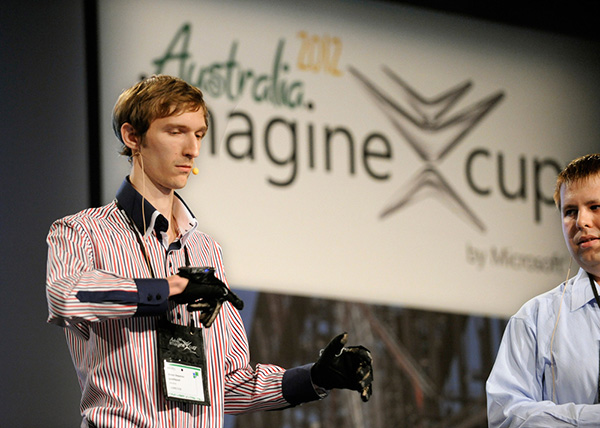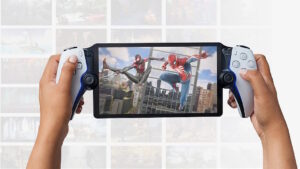
(Photo credit: Microsoft)
After four days of presentations and product demonstrations, the student team from Ukraine emerged on Tuesday as this year’s Imagine Cup Software Design champion, beating Japan and Portugal to the US$25,000 top prize.
The Ukrainian students tackled communication problems for the hearing impaired with their project “EnableTalk”, where a pair of gloves equipped with various sensors and a microcontroller continuously recognises sign language patterns as they are performed by the wearer.
These patterns are then transmitted via Bluetooth to a Windows Phone device, where they are run through the Microsoft Speech and Bing APIs to be translated into audio.
All of these processes happen in real time, allowing conversation to flow more freely between the hearing and speech impaired and those who don’t know sign language.
“We were inspired to help our friends who are hearing- and speech-impaired to have the ability to communicate like everyone else,” said team member Maxim Osika.
The team expects to sell each pair of gloves for around US$20 if they can ramp up production to lower costs, and each pair will come with a library of standard gestures which can be expanded to include the different sign languages around the world.
Taking home the second prize was a team from Japan, who devised a way for lamps to “talk” to one another, detect how much light is in a room and automatically dim lights wherever necessary.
The Portugal team went home with the third prize for their efforts in building a shopping cart which follows disabled people through the use of Kinect sensors.
Strong showing by Singapore team
Representing Singapore, Joshua Sim from Nanyang Polytechnic clinched the third prize in the IT Challenge category, which tested participants’ knowledge of IT systems and tasked them with unique scenarios to solve.
Singapore’s software design team, also from Nanyang Polytechnic, managed to break through to the top 20, but was eliminated from the second round of the competition.
Despite not winning any prize money, third-year occupational therapy student Nur Nadiah Binte Zailani intends to further the team’s work in helping dementia therapy.
“I’ll try to look for other sources of funding, and continue developing the project,” she said. However, her male team mates will be unable to continue due to their commitment to national service.
You can view the full list of winners for each of the categories here.






